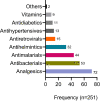Prevalence and Determinants of Household Medication Storage During the COVID-19 Outbreak in Southwest Ethiopia
- PMID: 36699285
- PMCID: PMC9869910
- DOI: 10.2147/DHPS.S392564
Prevalence and Determinants of Household Medication Storage During the COVID-19 Outbreak in Southwest Ethiopia
Abstract
Background: Most households worldwide keep medicines on hand for various reasons, including emergency use, treatment of acute and chronic diseases, and anticipated future use. Being infected or fear of getting COVID-19 in the current pandemic could increase the storage of drugs at home. Thus, this study aimed to assess the prevalence of household storage of medicines and associated factors in southwest Ethiopia during the COVID-19 outbreak.
Methods: A cross-sectional household survey was conducted from February 1 to May 30, 2022. Data on the extent of storage, storage conditions, their current status, disposal methods, among others, were collected through structured interviews and observations. The data were entered into EPI info, exported, and analyzed using Statistical Packages for Social Sciences (SPSS). Bivariate followed by multivariate logistic regression was used to identify associated factors. P-value <0.05 was used as a cut-off point to decide statistical significance.
Results: The magnitude of household medication storage was 48% (95% CI). Analgesics (28.7%) and antibacterial (21.1%) agents were the most predominant class of drugs stored in the households. The most significant proportion of the home-stored medications (34.7%) was reserved for future use, and 31.8% were for treating current medical conditions. The majority of the respondents (84.1%) had never heard/learned about the safe disposal ways of drugs. The presence of children aged less than 5 years in a household [AOR = 1.90 (1.19, 3.05)] and the existence of chronically sick patients in a household [AOR = 4.3 (2.25, 8.45)] were factors significantly associated with household medication storage.
Conclusion: The current study revealed a high prevalence of home medication storage; thus, to lessen or eliminate the negative consequences of storing medications at home, it is necessary to review the medication utilization chain and offer community-based training on proper medication storage and disposal techniques, including establishing take-back programs.
Keywords: COVID-19; disposal; household; medication storage; southwest Ethiopia.
© 2023 Kahssay et al.
Conflict of interest statement
The authors declare that they have no competing interests in this work.
Figures
Similar articles
-
Household storage and disposal of unused and expired medicines in Dessie, Ethiopia: a cross-sectional study.Front Public Health. 2024 Oct 24;12:1422304. doi: 10.3389/fpubh.2024.1422304. eCollection 2024. Front Public Health. 2024. PMID: 39512718 Free PMC article.
-
The magnitude and associated factors of unused medications storage practice among households in Jimma city, southwest of Ethiopia: Community-based cross-sectional study.Explor Res Clin Soc Pharm. 2024 Jun 8;15:100459. doi: 10.1016/j.rcsop.2024.100459. eCollection 2024 Sep. Explor Res Clin Soc Pharm. 2024. PMID: 38983638 Free PMC article.
-
Household Pharmaceutical Disposal Practices, Community Understanding, and Readiness for Medicines Take-Back in Asmara, Eritrea: A Cross-Sectional Analysis.Risk Manag Healthc Policy. 2024 Nov 11;17:2777-2788. doi: 10.2147/RMHP.S478511. eCollection 2024. Risk Manag Healthc Policy. 2024. PMID: 39554981 Free PMC article.
-
Medicine storage, wastage, and associated determinants among urban households: a systematic review and meta-analysis of household surveys.BMC Public Health. 2021 Jun 12;21(1):1127. doi: 10.1186/s12889-021-11100-4. BMC Public Health. 2021. PMID: 34118923 Free PMC article.
-
Storage and disposal of pharmaceuticals at home: a systematic review.Cien Saude Colet. 2020 Feb;25(2):585-594. doi: 10.1590/1413-81232020252.10882018. Epub 2018 Jun 20. Cien Saude Colet. 2020. PMID: 32022198 English, Portuguese.
Cited by
-
Modeling Predictors of Medication Waste Reduction Intention in Algeria: Extending the Theory of Planned Behavior.Int J Environ Res Public Health. 2023 Aug 16;20(16):6584. doi: 10.3390/ijerph20166584. Int J Environ Res Public Health. 2023. PMID: 37623170 Free PMC article.
-
Prevalence and determinants of household medicine storage in Vietnam: A community-based cross-sectional study.SAGE Open Med. 2024 Jan 25;12:20503121241227371. doi: 10.1177/20503121241227371. eCollection 2024. SAGE Open Med. 2024. PMID: 38283647 Free PMC article.
-
Self-medication and medication storage practices among Lira University students in Lira city, Northern Uganda.Front Public Health. 2023 Nov 3;11:1259279. doi: 10.3389/fpubh.2023.1259279. eCollection 2023. Front Public Health. 2023. PMID: 38026339 Free PMC article.
-
Disposal practice and determinants of unused medicines among the general public in Gondar City, Northwest Ethiopia.Front Public Health. 2025 Feb 27;13:1516809. doi: 10.3389/fpubh.2025.1516809. eCollection 2025. Front Public Health. 2025. PMID: 40084200 Free PMC article.
References
-
- World Health Organization. Promoting rational use of medicines: core components patient care indicators; 2022. Available from: https://scholar.google.com/scholar?hl=en≈sdt=0%2C5&q=World+Health+Organi.... Accessed January 12, 2023.
LinkOut - more resources
Full Text Sources




